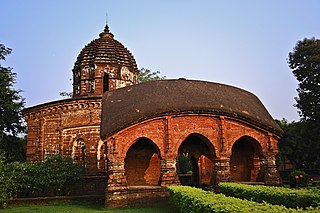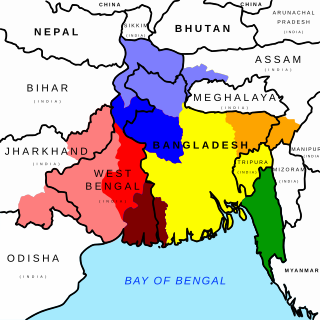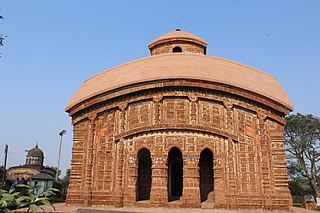
Bishnupur is a city and a municipality in Bankura district, West Bengal, India. It has terracotta temples built by the Malla rulers, historic Radha Krishna temples built during 1600–1800 CE and the Baluchari sarees. In 1997 the temples of Bishnupur were placed on the UNESCO World Heritage Site's Tentative list.

Mallabhum was the kingdom ruled by the Malla kings of Bishnupur, primarily in the present Bankura district in Indian state of West Bengal.

The Rasmancha is a historical temple located at Bishnupur, Bankura district, West Bengal, India. It was commissioned by Mallabhum king Hambir Malla Dev in 1600 CE. Length and breadth of this temple is 24.5 meter and the height is 12.5 meter. The base of the temple is made of laterite stone and upper part is made with bricks.

Raghunath Malla Dev, also known as Raghunath Singha Dev, was the fifty-first king of the Mallabhum. He ruled from 1626 to 1656 CE.

Bir Singha Dev was the fifty-second king of the Mallabhum. He ruled from 1656 to 1682 CE.

Gokulchand Temple is a 17th-century stone built pancharatna temple in Gokulnagar village in the Joypur CD block in the Bishnupur subdivision of the Bankura district in the state of West Bengal, India.
Madanmohanpur is a village in the Sonamukhi CD block in the Bishnupur subdivision of the Bankura district in the state of West Bengal, India.

Radha Madhab Temple is a Hindu temple located in Bishnupur, West Bengal, India. The temple was built in 1737 by Churamoni, wife of Gopal Singha Dev I of Mallabhum, and is dedicated to Radha and Krishna.

Bengal temple architecture also known as Malla dynasty architecture is about temple styles developed and used in Bengal, particularly the chala, ratna and dalan temples.

Radh Bengal is a region in West Bengal also known as the Temple Town. This region consists of arrays of temples in varying sizes and devoted to different gods and goddess but the common thread unifying this group is that the temples are constructed in terracotta. The region consists of following districts Birbhum, Bankura, Burdwan, Purulia and parts of Murshidabad. The construction style originated in 16th century and lasted till the 19th century. This period is also referred as a golden age of temple in West Bengal. Reason for development of this construction technique was the rich red laterite soil of the region and lack of construction worthy stone. The skill of creating daily objects from like vessels, pottery, seal and toys evolved into a construction technique in the time of need. These temples are baked terracotta panels or bricks. This particular style spread outside the present day West Bengal as well, to Jharkhand, Bihar, Assam and Tripura.

Keshto Ray Temple, also known as Jor-Bangla Temple, is a Krishna temple at Bishnupur city of Medinipur Division. In the past, the Hindu god Krishna was worshiped as Keshto Ray in this temple. According to the Inscriptional plaque, the temple was founded by 51st King of Mallabhum kingdom Raghunath Singha in 1655. The temple is a great example of Jor-Bangla temple architecture, which belong to the chala style.

Madan Mohan Temple or Madanamōhana mandir is a Krishna temple in Bishnupur town of Medinipur division. In the past, the Hindu deity Krishna was worshiped in the form of Madanamohan in this temple, but currently no worship is conducted. According to the foundation plaque found in the temple, the temple was founded in 1694 AD by King Durjan Singha Dev of Mallabhum. The temple is a unique example of ekaratna temple architecture, which belongs to the Ratna style developed in medieval Bengal.

Radha Shyam Temple or Rādhāśyāma mandir is a Krishna temple in Bishnupur town of Medinipur division in Indian state of West Bengal. In this temple, the Hindu god Krishna is worshiped in the form of Shyam; along with Shyam, the murti of Radha is also worshipped. According to the foundation plaque found in the temple, the temple was founded in 1758 by King Chaitanya Singha of Mallabhum. The temple is a unique example of eka-ratna temple architecture, which belongs to the ratna style developed in medieval Bengal.

Shyam Ray Temple also known as Pancha-ratna temple, is a Krishna temple in Bishnupur town of Medinipur division in Indian state of West Bengal. In this temple, the Hindu God Krishna is worshiped in the form of Shyam; along with Shyam, the murti of Radhika (Radha) is also worshipped. According to the foundation plaque found in the temple, the temple was founded in 1643 by King Raghunath Singha of Mallabhum. The Temple is built in the Pancha-ratna temple architecture, which belongs to the ratna style developed in medieval Bengal.

Malleswar Temple also known as Mallesvara Temple, is a Shiva temple in Bishnupur in Indian state of West Bengal. This temple was dedicated to Shiva.

Jor Mandir also known as group of temples, Located in Bishnupur in Indian state of West Bengal.

Kalachand Temple, Located in Bishnupur in Indian state of West Bengal.

Lalji Temple, Located in Bishnupur in Indian state of West Bengal.

Radhabinod Temple also known as Radha Vinod Temple, Located in Bishnupur in Indian state of West Bengal.






















